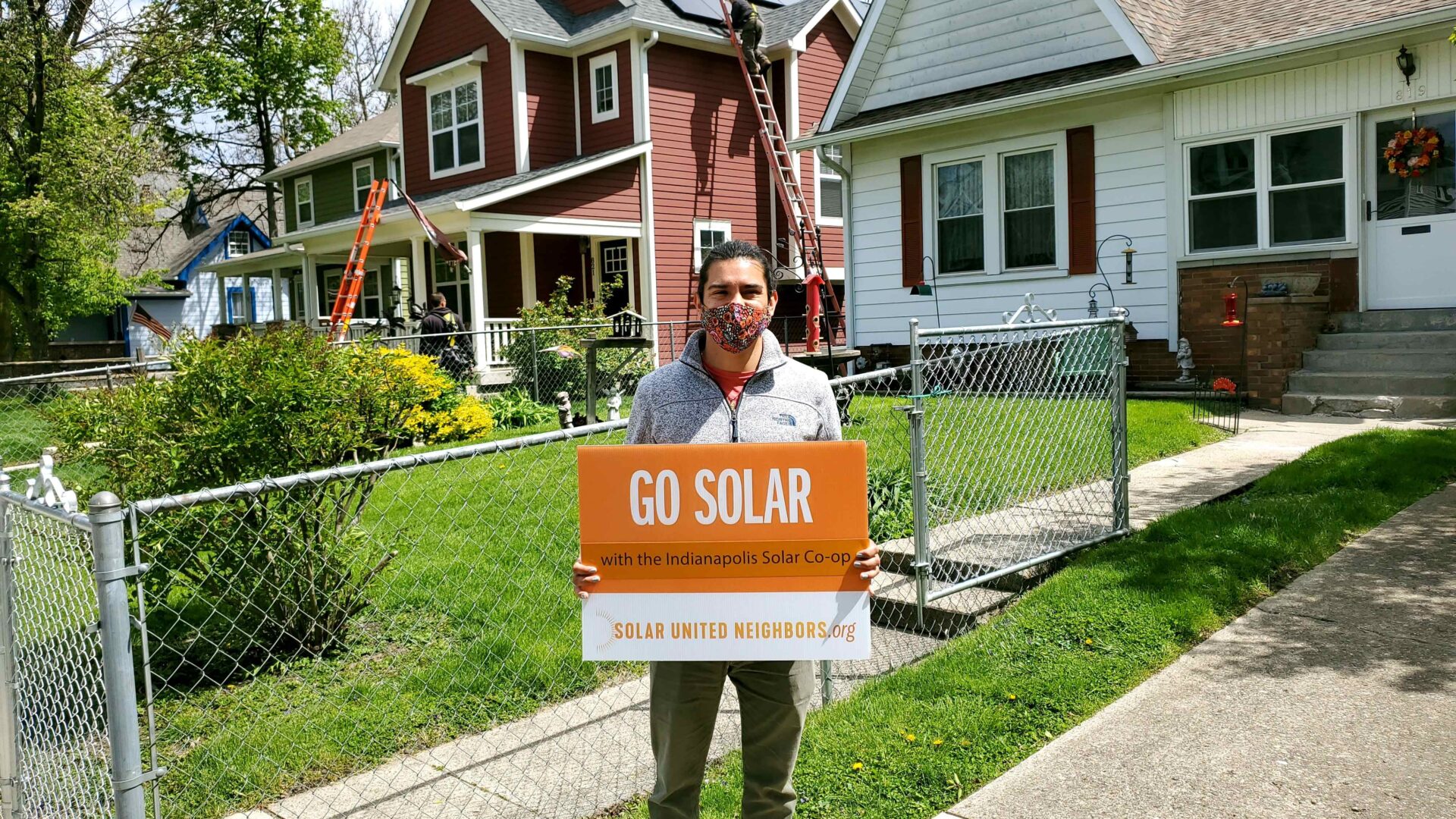State legislature limits growth of Indiana solar energy
- Energy democracy & policy

Indianapolis, IN— As the Independence Day weekend approaches, Hoosiers will have less freedom to lower their outrageous energy bills. Effective July 1, Hoosiers who pay an electric bill to one of the five Indiana investor-owned utilities—Duke Energy Indiana, Indiana Michigan Power, NIPSCO, CenterPoint (formerly known as Vectren), or AES Indiana (formerly known as Indianapolis Power & Light)—will no longer be allowed to participate in a longstanding policy known as net metering when they install rooftop solar or another type of distributed generation system.
A broad coalition of solar developers and installers, and consumer, environmental, and solar advocates are joining together to condemn this major policy change by the state legislature, which will result in diminishing Hoosiers’ rights to energy freedom by using solar energy to reduce skyrocketing electric bills.
This shortsighted and unsubstantiated change in public policy was instituted at the behest of Indiana’s monopoly utilities via Senate Enrolled Act 309 (SEA309), which was passed by the Indiana General Assembly and signed into law by Governor Eric Holcomb in 2017.
“Instead of empowering Hoosier homeowners and Indiana-grown small businesses with the ability to manage their energy destiny by harnessing homemade energy, Indiana is taking a huge step backward by allowing net metering to expire,” said Zach Schalk, Indiana Program Director for Solar United Neighbors. “Rooftop solar is a powerful tool to enhance the reliability and resiliency of the electric grid. It makes no sense to eliminate net metering as grid operators are warning of electric capacity shortfalls and the threat of rolling blackouts.”
Net metering is a fair and simple way to credit solar owners for the electricity they generate but don’t use themselves. Instead, the solar owner earns a bill credit for energy shared with their neighbors on the electric grid valued at the same rate as electricity purchased from the utility – an even 1:1 swap. As a result of SEA309, Indiana’s investor-owned utilities will replace net metering with an arbitrarily designed Excess Distributed Generation (EDG) policy that credits new solar customers at a dramatically lower rate for the extra electricity they generate and share with their neighbors.
Further compounding the unjustifiably low EDG rate is the dispute over how the EDG credits are calculated on customer bills, which will further and substantially diminish compensation to EDG solar customers. The monopoly utilities refer to the desired change in calculating credits as ‘instantaneous netting’, instead of ‘monthly netting’ under existing law.
“It’s more appropriate to refer to this new methodology as no-netting,” said Ben Inskeep, Program Director at Citizens Action Coalition. “No-netting is a back-handed scheme designed by the investor-owned monopolies to obstruct Hoosier consumers who are trying to free themselves from monopoly control and their confiscatory and exorbitant energy prices.”
Although no-netting was neither authorized by SEA 309 nor is allowed within existing administrative rules, the Indiana Utility Regulatory Commission (IURC) approved the no-netting methodology. The IURC approval of no-netting was reversed by the Indiana Court of Appeals (COA) after multiple groups, led by the Office of Utility Consumer Counselor (OUCC), appealed the IURC final order in the first EDG case filed by CenterPoint Energy.
After losing their no-netting argument at the COA, the utilities, along with the IURC, have taken the issue to the Indiana Supreme Court in an effort that further discourages new customers from installing solar. The Indiana Supreme Court recently accepted transfer of the CenterPoint EDG case, thereby vacating the COA decision rejecting no-netting. The Indiana Supreme Court has scheduled the case for oral arguments on Sept. 15 at 9 am.
Current and prospective solar customers, as well as solar developers and installers, are now in limbo as a critical aspect of how their electric bills will be calculated remains pending in the Courts. The combination of the end of net metering and the potential change in how credits will be measured would make rooftop solar uneconomic for most Hoosier families, churches, businesses, schools, and government buildings.
“We understand that state legislators wanted to change how solar customers were credited for excess electricity put back on the grid,” said Laura Ann Arnold, President of Indiana Distributed Energy Alliance (IndianaDG). “But this rewriting of Indiana statute by the IURC was an egregious decision which will decimate the nascent Indiana rooftop solar industry by discouraging Hoosier ratepayers who want to install solar to reduce their electric bills.”
These policy changes undermine the very solutions Hoosiers desperately need and want deployed today. Rooftop solar, along with other clean, distributed energy generation technologies and end-use energy efficiency, are critical solutions for lowering the cost of power, addressing the climate crisis, and keeping the lights on for all Hoosiers.
Carmel Green Initiative, Citizens Action Coalition (CAC), Climate Reality Central Indiana Chapter, Direct Action Against CenterPoint Energy (DAACE), Earth Charter Indiana, Elders Climate Action Heartland Chapter, Energy Matters Community Coalition Inc, Faith in Place, Hoosier Environmental Council (HEC), Indiana Distributed Energy Alliance (IndianaDG), Sierra Club Beyond Coal, Sierra Club Hoosier Chapter, Solar United Neighbors (SUN), Solarize Indiana, and Valley Watch call on Indiana utilities to stop this attack on solar and urge Indiana policymakers to take immediate action defending Hoosier energy freedom by restoring fair compensation for customer-owned solar generation.
# # #
Background information on SEA 309, pending cases, and the changes in net metering and solar policy in Indiana available at the links below.
The state of net metering in Indiana
Get the latest on solar straight to your inbox.
Fight for your solar rights.
Everyone has the right to go solar. Spread the sunshine nationwide and in your local community by taking action, joining events, and more.